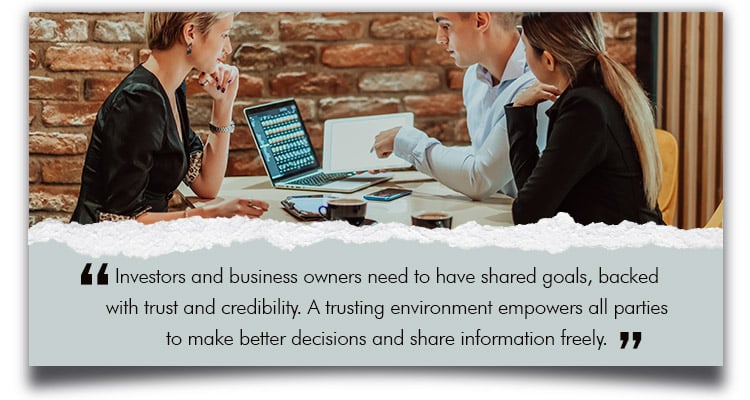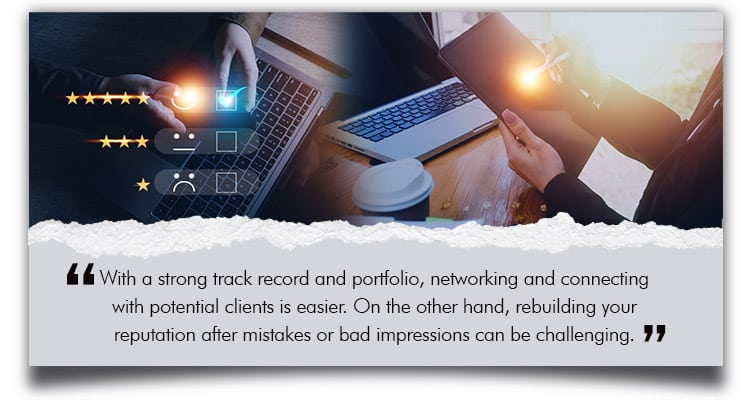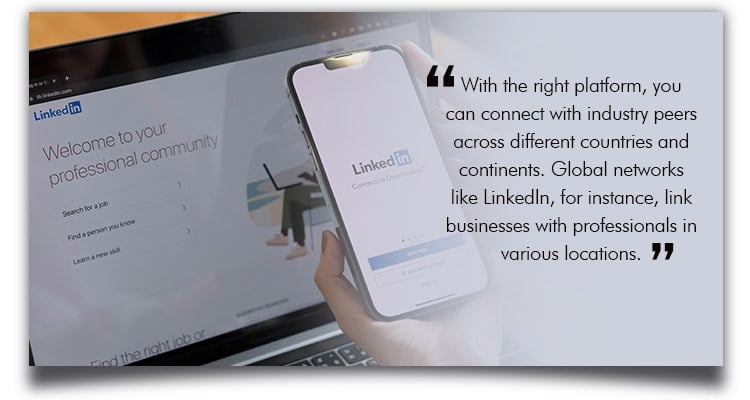In business, it’s not always what you know – it’s also who you know.
Many business owners attend events to network, meet other entrepreneurs and leaders, and explore potential business opportunities.
However, networking is easier said than done. You need to be genuine and intentional in every interaction. But how exactly do you do this? Is there a one-size-fits-all approach to building business relationships?
In this article, we will look at the science and art of networking and how you can use it to build and grow your business.
Why Networking is Crucial for SMB Growth in Australia
A whopping 97.2% of businesses in Australia are classified as small and medium-sized businesses (SMBs). So, what does this imply?
This simply means that competition is fierce in a landscape dominated by small businesses. Each establishment needs to adapt and offer relevant products and services to stay afloat.
Hence, the need to network to learn from experienced entrepreneurs, connect with investors, and collaborate with other businesses.
The Role of Networking in Small Business Success
Networking is more than just exchanging business cards. You don’t attend events and conferences just to collect names to add to your phone book. Rather, it’s considered as a form of word-of-mouth B2B marketing.
Networking events serve as a platform to share what you do and connect with other professionals. It’s where you can discuss your latest projects, learn from others’ research and development, and eventually, increase the likelihood of referrals and recommendations.
 Moreover, engaging with other business leaders keeps you updated on the latest industry trends, technologies, and best practices. With all these at your disposal, you’re more likely to create new products or improve your services.
Moreover, engaging with other business leaders keeps you updated on the latest industry trends, technologies, and best practices. With all these at your disposal, you’re more likely to create new products or improve your services.
How Strong Connections Create Opportunities for Partnerships and Growth
Great businessmen are skilled at reading people. They can tell when someone is sincere and genuine, helping them decide who to trust—and those are the people they do business with.
Business deals often involve complex negotiations and intricate interpersonal dynamics. Thus, the ability to read people helps businessmen understand the motivations, goals, and concerns of the other party.
Simply put, business is built on trust. If you want someone to bring you business, make them like you first.
Key Networking Channels for SMBs in Australia
There are many ways to network, especially if you’re an Australian business owner. Some of the most accessible channels include:
- Social Media – Platforms like LinkedIn, Facebook, and Instagram are commonly used to connect with customers and collaborate with other businesses.
- Online Forums – There are also online communities such as Quora wherein business owners share insights, answer questions, and build relationships with other professionals.
- Industry Conferences – Onsite conferences and trade shows offer valuable opportunities to connect with potential clients and partners.
- Community Events – Festivals, markets, and community fairs are also great ways to connect with potential customers and build local relationships.
- Referrals – Encourage satisfied customers and clients to refer your business to their network.
How to Build Meaningful Business Relationships
Entrepreneurship is challenging because you’re not just creating products, you’re also building relationships. And dealing with people is harder than handling inanimate objects.
Hence, you have to be emphatic yet strategic when it comes to dealing with your employees, customers, and potential investors.

But the big question is, how?
The Difference Between Transactional and Strategic Networking
Many people equate networking to landing clients and closing business deals immediately. However, it’s actually more than that.
Small business networking can either be transactional or strategic.
- Transactional Networking – This focuses on short-term gains and is typically less personal and more superficial.For example, if you’re looking for a new client for a project, you’d focus on exchanging the necessary details to get the job done. There’s little focus on building a personal connection. The main goal is to move the project forward, not to get to know the person behind the business.
- Strategic Networking – On the other hand, strategic networking is about building long-term, mutually beneficial relationships. The goal is to create lasting connections, like offering support, opportunities, and value.
This could mean mentoring a younger professional, learning from expert insights, or collaborating on a project with another business.
In other words, transactional networking is about getting what you need at the moment, while strategic networking is about building a support system that will deliver value over time.
Both approaches can be useful in different situations, but if you’re looking to grow and expand your business, strategic networking is more beneficial.
The Importance of Trust and Credibility in Professional Relationships
Business is built on trust.
Team members must feel comfortable sharing ideas, concerns, and feedback without fear of judgment or criticism. The same goes for potential investors and clients.
Investors and business owners need to have shared goals, backed with trust and credibility. A trusting environment empowers all parties to make better decisions and share information freely.

Additionally, trust is crucial for long-term client relationships. When clients trust a business, they’re more likely to become repeat customers and refer others.
How to Nurture Long-Term Connections for Sustainable Business Growth
Building business relationships in AU is tough enough, and they also need nurturing. Fortunately, there are ways to nurture long-term Australian business connections, such as:
- Moving Beyond the Sale – Don’t focus on closing deals. Instead, prioritise building genuine relationships with clients. Ask about experience and listen to their suggestions on how to improve your product or service.
- Providing Exceptional Customer Service – Always go above and beyond to exceed their expectations and express gratitude for their business and loyalty.
- Staying in Touch – Studies show that companies earn more business from repeat transactions than new clients. So, make sure to check in with your clients through personalised email newsletters or social media posts.
- Addressing Concerns Promptly – Respond to client concerns and complaints quickly. If they’re dissatisfied with the service, apologise with genuine sincerity and do everything you can to make it right. More importantly, let them know you’re working to improve and prevent future issues.
Online and Offline Networking Strategies for SMBs
Before the internet, SMBs relied on face-to-face events to network. They had to travel to different cities and countries to meet like-minded people and secure new business deals.
However, technology made things easier.
Online Networking
Today, you can connect with business leaders from thousands of miles away with just one click. Virtual seminars and social media have made it easy for business leaders worldwide to engage with each other. Let’s take a look:
- LinkedIn – LinkedIn lets professionals expand their network beyond their immediate work circles. They can connect with industry peers, influencers, and mentors, creating opportunities for virtual exchanges and guidance.
- Virtual Industry Events – Online forums and webinars give business owners and potential clients a chance to engage in industry discussions. Since they’re virtual, entrepreneurs don’t need to travel or pay for accommodations, making networking more accessible and affordable.
- Global Talent – More importantly, online networking lets business owners find skilled professionals beyond their location. For example, many Australian entrepreneurs hire Filipino remote professionals for their HR, IT, marketing, and administrative needs.
Offline Networking
Aside from online events, Australian business owners can attend in-person events to meet potential clients and other business leaders.
- Attending Business Expos – Expos give businesses a platform to showcase their products or services to a targeted audience. For example, construction firms usually attend the Sydney Build Expo to present their project portfolio to potential clients.
- Joining Local Chambers of Commerce – Joining local chambers boosts brand visibility in the community. Many chambers offer marketing opportunities, as well as access to business advice, mentorship, and workshops led by experienced entrepreneurs.
- Connecting with Aussie Business Mentors – Mentors offer guidance on business planning, marketing, operations, finance, and other key areas. With their experience, they help SMBs avoid pitfalls, tackle challenges, and find effective solutions.
Overcoming Networking Challenges for SMB Owners
Networking can be challenging, especially for introverted business owners as it doesn’t always come naturally.
Hence, without the right strategy, making meaningful connections at events can be tough. So, how can you ensure effective engagement and warm outreach success if you’re not particularly outgoing?
 Let’s take a look.
Let’s take a look.
Breaking Into Established Business Circles as an SMB Owner
It all starts with building your personal brand. What kind of leader do you want to be, and how do you want others to see you?
Personal branding will shape how you want others to perceive you through:
- The way you present yourself;
- Your communication style; and
- How you engage with others in your industry or community.
Simply put, it’s about building a reputation that aligns with your business goals and values.
Once you have your personal brand, it’s time to identify your target circles. These may include:
- Industry-Specific
-
- Chambers of Commerce
- Industry associations
- Trade shows
- Conferences
- Local Business Groups
-
- Rotary Club
- Lions Club
- Local business improvement districts
After identifying your ideal groups, ensure that your online presence, such as your website, social media, and business card are polished and professional.
Building Trust with Industry Leaders and Potential Partners
The business world is small, and people in the same industry often know each other.
With a strong track record and portfolio, networking and connecting with potential clients is easier. On the other hand, rebuilding your reputation after mistakes or bad impressions can be challenging.
 Hence, it’s important to do things right the first time around. Here’s how:
Hence, it’s important to do things right the first time around. Here’s how:
- Demonstrate Expertise and Credibility – Always put your best foot forward. Maintain a high level of professionalism in all interactions, from communication to presentation.
Share useful insights at industry events, join discussions, and listen to others. Also, highlight your industry knowledge through past and current projects.
- Engage in Honest Conversations – Business leaders are good at reading people, so be open and honest about your business, including its strengths, weaknesses, and goals.
It’s also important to pay attention to others’ needs and concerns. Ask thoughtful questions and truly listen to their answers. Clients and investors are more likely to trust those who show genuine interest.
- Deliver on Promises – Underpromise and overdeliver. As much as possible, strive to exceed expectations to show your commitment and reliability.
Clients often start with small projects to test your skills and reliability. These smaller tasks serve as a “trial period” where they gauge the quality of your work, how you meet deadlines, and how well you can solve problems. If you do well, you can gain their trust and they’ll feel more comfortable entrusting you with bigger projects.
Navigating Cross-Cultural Communication and Collaborations
Every successful entrepreneur has dealt with people from all walks of life. Thus, building a business also means understanding cultural nuances – especially in the age of globalisation.
How is this done?
- Research – Before attending conferences, especially in other countries, learn about the local cultural norms, values, and communication styles.
For example, in Japan, bowing is the typical way to greet and show respect. People also remove their shoes when entering a home, slurp noodles while eating, and uphold punctuality.
 By taking note of these things, you’ll be more likely to engage in meaningful discussions. Demonstrating respect for the cultural nuances of your host will also go a long way towards getting their good will.
By taking note of these things, you’ll be more likely to engage in meaningful discussions. Demonstrating respect for the cultural nuances of your host will also go a long way towards getting their good will.
- Show Genuine Interest – Be genuinely curious about other cultures. Pay attention to their stories and how they communicate, both verbally and nonverbally.
Learn simple phrases like “good morning,” “thank you,” and “please” in different languages. Be mindful of your tone, and ensure clarity in emails and other written communication to avoid misunderstandings.
- Be Flexible – Be open to finding mutually agreeable solutions and focus on finding common ground.
Despite cultural differences, identify common goals, values, and interests. By focusing on areas of agreement, you’ll shift the focus from differences to shared objectives.
Leveraging Filipino Offshore Talent for SMB Success
Outsourcing to the Philippines has been one of the best-kept secrets of many Australian business owners.
The Filipino remote workforce is known for their skills, work ethic, and positive attitude. You can count on them to deliver quality work at competitive rates – always with a smile.
Filipinos are excellent English speakers compared to most of their Asian counterparts. For instance, Filipino BPO services are highly sought after by businesses worldwide for their client-oriented approach and commitment to providing excellent service.
Filipinos are also known for their friendly and optimistic demeanor. Their positive attitude fosters a pleasant and productive work environment, making them valuable assets wherever they go.
Why Australian Businesses Are Embracing Offshore Talent
Recent data shows that AU firms are hiring more remote workers this 2025 – and for good reasons.
Offshore outsourcing cuts overhead costs like office space, equipment, and employee benefits. It also gives businesses access to a large pool of skilled professionals in fields like IT, engineering, finance, and customer service.
Additionally, it also offers the flexibility to quickly adjust the workforce based on your business needs. This is especially helpful for companies with seasonal changes or those handling short-term projects.
More importantly, by outsourcing non-core tasks, business owners can focus on improving services, boosting sales, and expanding their product lines.
The Role of Global Networking in Finding Offshore Professionals
Now more than ever, entrepreneurs must learn to network. Fortunately, thanks to the internet, you’re no longer limited by your geographical location.
With the right platform, you can connect with industry peers across different countries and continents. Global networks like LinkedIn, for instance, link businesses with professionals in various locations.

Network contacts can refer qualified candidates, leading to more reliable and suitable hires. Global networks also help form partnerships with local companies, universities, and professional organisations.
The Value of Filipino Offshore Talent in SMB Growth
The Philippines has a large, skilled workforce in fields like IT support, software development, and creative services, making it a great source of offshore talent.
Adaptability to International Business Standards and Remote Collaboration
Other countries like India, Mexico, the U.S., and Canada also provide remote workers, but why do many Australian companies prefer hiring Filipinos?
- Competitive Rates – Filipinos offer high-quality work at a more affordable rate than workers from other countries.
Due to the lower cost of living in the Philippines, remote workers earn above-average salaries locally, This allows small businesses to boost profit margins while still offering competitive pay.
- English Fluency – Filipinos are fluent in English because it’s the primary language of instruction. This eliminates communication barriers for businesses, as Filipino remote workers are trained to meet international standards in both written and spoken communication.
The Business Case for Outsourcing: Cost and Scalability
Outsourcing offers businesses the flexibility to scale up or down based on demand.
For example, a marketing company can hire extra graphic designers during busy seasons to meet demand. This flexibility is especially valuable for startups, as it helps manage fluctuating needs and save costs during slower periods.
 Moreover, you don’t need to limit talent within your city or country. No matter where you’re located, you can hire skilled professionals who deliver quality work. This allows you to connect with talented writers, designers, and product experts who can help take your business to the next level.
Moreover, you don’t need to limit talent within your city or country. No matter where you’re located, you can hire skilled professionals who deliver quality work. This allows you to connect with talented writers, designers, and product experts who can help take your business to the next level.
Frequently Asked Questions
Here are some questions business owners often have about networking:
#1. What Are the Best Ways to Network as a Small Business Owner in Australia?
Networking can be challenging, especially for first-timers or introverts, but here are some tips to help you get started:
- Join Groups – Find groups focused on specific interests or challenges;
- Attend Events – Attend networking events such as conferences and trade shows to meet potential clients or business partners;
- Use Online Platforms – Build a strong, professional profile through LinkedIn, Facebook, or Instagram;
- Connect with the Community – Connect with other business leaders and give back to the community; and
- Go the Extra Mile – Always provide exceptional customer service and encourage satisfied customers to recommend your business to others.
#2. What Are the Key Differences Between Online and Offline Networking?
While each can be beneficial, there are distinct differences between the two:
- Online Networking
-
- Global reach – Connecting with people worldwide;
- Convenience – Accessible anytime, anywhere with an internet connection; and
- Cost – Often more affordable than in-person events.
- Offline Networking
- Depth – Builds deeper, more personal relationships;
- Community Building – Strengthens local business relationships; and
- Visibility – Increases brand visibility and local presence.
Simply put, online networking is great for making initial connections, while offline networking is more effective for building stronger relationships. Both are important for business growth.
#3. How Do I Maintain and Nurture Professional Relationships Over Time?
Networking isn’t a one-time effort. You have to consistently and continuously make an effort to make it work.
But how?
- Regular Check-ins – Schedule brief check-ins with the help of your virtual assistant through monthly emails to stay on top-of-mind;
- Social Media Interactions – After connecting with industry peers, engage and comment on their posts and share their content; and
- Personalised Touches – Be a friend. Send birthday wishes, holiday greetings, or congratulations on personal or professional milestones. These small gestures can make a big impact and help build lasting relationships.
Strengthening Your SMB Through Smart Networking
Similar to building a business, networking requires intentional effort and consistency. The good news is, the more you practice, the better you’ll become at it.
You don’t even have to organise events yourself. Simply show up when invited, connect with others, and be genuinely curious about what they do. Use social media to connect with industry peers globally and collaborate with local partners to create events that truly benefit the community.
 When you show genuine interest in others, they’ll start to notice. Eventually, they’ll become curious about what you do – and who knows where that could lead? The possibilities are endless.
When you show genuine interest in others, they’ll start to notice. Eventually, they’ll become curious about what you do – and who knows where that could lead? The possibilities are endless.
If you’re ready to start networking, free up some of your time by delegating non-core tasks to skilled professionals. For assistance, call us today or request a call back now.
- Want FREE AI Prompts for Different Areas of Your Business? Check out these 100 AI prompts.
- Curious About How to SAVE and Maximize on Taxes? Learn more here.
- If you’re ready to experience the full advantages of working with a top global team, check out our 1,000 fully vetted and highly talented staff here.
Syrine is studying law while working as a content writer. When she’s not writing or studying, she engages in tutoring, events planning, and social media browsing. In 2021, she published her book, Stellar Thoughts.




















